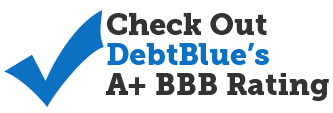Debt Settlement
to Get Back on Track Financially
Significantly reduce what you owe
Get rid of your credit card debt in 36 months or less
One low monthly deposit
Results are guaranteed or you pay nothing to DebtBlue
Unlike Bankruptcy and Consolidation, debt settlement is not reported on your credit file
Debt Settlement from DebtBlue
DebtBlue is a Debt Settlement firm. This means we take the time to listen to your specific situation, understand how much credit card debt you have, and then negotiate with your creditors on your behalf to get them to forgive, settle or take an offer for less than you owe. Debt Settlement works for debts that are classified as “unsecured debt.” Unsecured debt includes Credit Cards, Medical Bills or Hospital Bills, Department Store Debts or even Cell Phone Debts. It will not work for secured debts like mortgages or car loans.
When you use a Debt Settlement firm, professionals negotiate with your creditors on your behalf. We take the hassle and stress off your shoulders and begin to work strategically for you to help you save the maximum amount possible. Every situation is different. It’s best to get all your credit card statements together so we can understand who the lenders are, how much you owe to each lender and how much debt you have. The more details you can give, the better the input we can offer as to the direction you take.
An aggressive but highly effective approach to consumer debt relief:
A Deeper Look at Debt Settlement
With a structured debt settlement program, a consumer will repay their debts in an average of two to three years. This is much less time than they would spend paying back their debts with other debt relief options while also avoiding bankruptcy.
With other debt relief options—like credit counseling, debt consolidation loans and Chapter 13 bankruptcy—there are debt repayment periods from three to five years.
There may be negative consequences to debt settlement for consumers to endure during the debt settlement process, including:
- collectors may continue calling,
- creditors aren’t guaranteed to agree to accept settlement offers,
- a consumer’s credit can suffer more damage than with other options, and
- they may owe taxes to the IRS on the amount of debt that’s cancelled.
These negative consequences for consumers in a debt settlement program can be well managed during the debt settlement process and successfully repaired after completion of the program. As with any debt relief option, you must weigh the overall benefits of debt settlement with all of the potential, negative side-effects of this option and must complete the program to see the desired results.
Debt settlement, also known as debt negotiation, debt reduction, or debt resolution, is the process of working to resolve debts for less than what a consumer owes. Typically, a debt settlement firm acts as the consumer’s advocate, working to lower principal balances and to resolve debts so that the consumer can achieve financial freedom. A debt settlement firm does not make monthly payments to creditors but rather negotiates directly with the consumer’s creditors while the consumer accumulates funds for the settlement through a monthly program payment. Debt settlement firms charge consumers a fee for their services. For compliant and ethical firms, this fee is only charged AFTER the client has had a successful resolution and received results.
Debt settlement is optimal for individuals or families who are in financial hardship or struggling with large debt burdens, and those who are looking for an alternative to bankruptcy. Debt settlement programs help qualified clients who stay with the program fully resolve their enrolled debts in approximately two to four years.
Unlike other forms of debt relief, debt settlement is based on the future resolution of a consumer’s accounts, which means that results vary significantly. It is very important to only work with a qualified and accredited Certified Debt Specialist (CDS) provider.
Debt Settlement Pros
Along with the potential of reducing total principal owed, debt settlement programs provide one low monthly program payment. This program payment is used to accumulate funds for the settlements. These payments are typically significantly less than minimum payments and the monthly payment required by a credit counseling firm. Consumers who stay with and complete a debt settlement program may be able to resolve all enrolled debt within two to four years versus five years for credit counseling or frequently up to 15 years (or more) when simply making minimum monthly payments. Compliant and ethical debt settlement companies only charge fees associated with debts that they actually resolve. No conflict of interest exists with creditors, because the debt settlement provider receives no payments from credit card companies and acts solely as the consumer’s credit advocate.
Debt Settlement Cons
Debt settlement can have a negative impact on credit scores, because consumers do not make payments to creditors while they are accumulating settlement funds; also, creditors or collectors are likely to contact consumers during the settlement period (consumers should expect help with managing collection calls from a good debt settlement company that acts as their credit advocate); fees and interest will accumulate during the settlement period, and should be taken into account when calculating savings; creditors can take legal action against consumers for unpaid accounts during the settlement period.
For Whom Does Debt Settlement Work Best?
Debt settlement is best suited for individuals who are struggling with very serious debt, who cannot make required minimum payments, and who would otherwise be considering bankruptcy or credit counseling. For consumers seeking a low monthly program payment and who want to resolve debts relatively quickly, debt settlement will be the best alternative.
Free Debt Relief Quote





